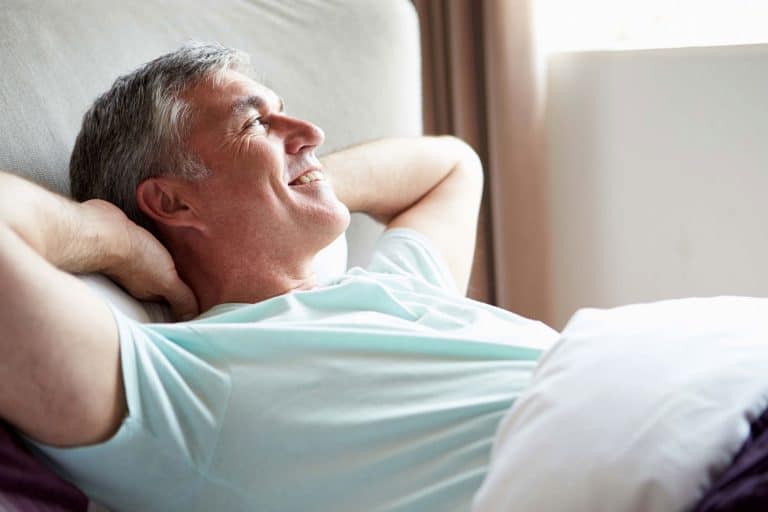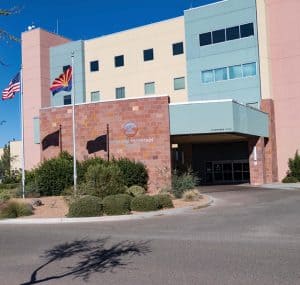Improving Your Sleep Quality for Better Health
Most people occasionally have trouble with sleep or fail to wake up refreshed. However, if your sleep problems are frequent and affecting your (or your partner’s) qualify of life, you may suffer from a sleep disorder, which can lead to serious health problems.
The Kingman Regional Medical Center (KRMC) Sleep Disorders Center features skilled staff and advanced technologies for diagnosing and treating sleep disorders. Our center is accredited by the American Academy of Sleep Medicine (AASM); an organization that sets the gold standard for medical sleep centers throughout the nation.
 Our staff includes board-certified physicians who specialize in sleep medicine and sleep technicians certified by the Board of Registered Polysomographic Technologists. Our facility features four private home-like rooms for conducting sleep studies (polysomnograms). The rooms are quiet and dark with comfortable beds and television.
Our staff includes board-certified physicians who specialize in sleep medicine and sleep technicians certified by the Board of Registered Polysomographic Technologists. Our facility features four private home-like rooms for conducting sleep studies (polysomnograms). The rooms are quiet and dark with comfortable beds and television.
Most medical insurance plans (including Medicare and AHCCCS) cover KRMC Sleep Disorders Center services upon referral of your primary care provider.
Diagnosing Sleep Disorders
Most sleep disorders are diagnosed by conducting a sleep study called polysomnography. This study involves spending the night (or day if you are a shift worker) in one of our comfortable private rooms.
To monitor your sleep, sensors are placed on your scalp, temples, chest and legs. You will not feel the sensors as they record your brain waves, the oxygen level in your blood, heart rate and breathing, and eye and leg movements while you sleep.
Sleep technicians in a separate area monitor your sleep with cameras and state-of-the-art technology, which records information from the sensors. This information can help doctors diagnose a variety of sleep disorders, which include:
- Circadian Rhythm Disorders – This disorder involves your internal sleep clock (circadian rhythm), which delays your sleep pattern from a normal sleep pattern, causing you to go to sleep later and wake up later.
- Insomnia – Insomnia is persistent inability to fall asleep, stay asleep, or both.Insomnia may be a primary problem, or it may be secondary due to other causes, such as a disease or medication.
- Narcolepsy – Narcolepsy is characterized by overwhelming daytime drowsiness and sudden attacks of sleep.
- Parasomnias – Parasomnias are undesirable behaviors or experiences during sleep, such as sleep walking, night terrors, etc.
- REM Behaviour Disorder – Rapid eye movement (REM) behavior disorder involves physically acting out vivid dreams with vocal sounds and sudden, often violent arm and leg movements during deep sleep.
- Restless Leg Syndrome – Restless legs syndrome (RLS) is a condition in which you have an uncontrollable urge to move your legs, usually in the evenings or nights while you’re sitting or lying down.
- Sleep Apnea – Sleep apnea is a potentially serious sleep disorder in which breathing repeatedly stops and starts. The main types of sleep apnea are: obstructive sleep apnea,which occurs when throat muscles relax; central sleep apnea, which occurs when your brain doesn’t send proper signals to the muscles that control breathing; and complex sleep apnea syndrome, which occurs when someone has both obstructive sleep apnea and central sleep apnea.
Treating Sleep Disorders
If you are diagnosed with a sleep disorder, our sleep medicine specialists will develop an individualized plan for treating your condition, which may include life-style changes, medications, and therapy.
Therapeutic treatments offered at the KRMC Sleep Disorders Center include:
- Continuous Positive Airway Pressure (CPAP) – This therapy involves using a special respirator (called a CPAP machine) during sleep to open your airways. Our center provides CPAP machines and supplies and assists you in using the device.
- PAP NAP – PAP NAP is a fairly new approach that helps people adjust to using CPAP therapy. It involves an abbreviated daytime sleep study to identify and correct specific problems you may be having with using a CPAP machine.
- Patient Education – We teach tools and techniques for improving your sleep habits for getting a good night’s sleep.
- Relaxation Therapy – This therapy involves relaxation techniques and other effective methods for reducing stress and anxiety that may be contributing to disruptive sleep. The therapy involves one-on-one sessions with a sleep medicine technologist certified in self-hypnosis.

